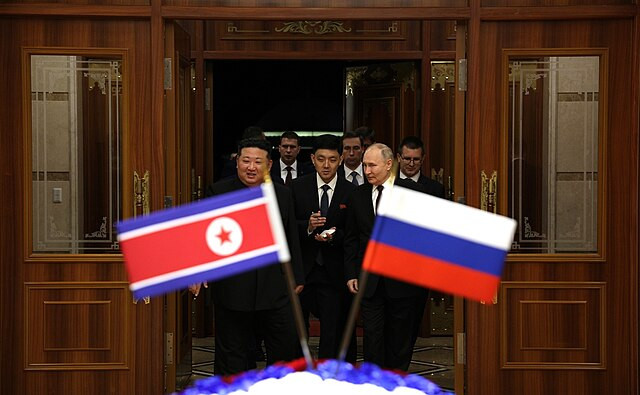China's long-standing alliance with North Korea is being tested as reports confirm that thousands of North Korean soldiers have been deployed to Russia, potentially to fight in the ongoing Ukraine war. This development has alarmed not only the United States and its allies but also China, which has historically been North Korea's main partner. As North Korean forces prepare to join Russia's battlefront, experts warn that the deepening relationship between Pyongyang and Moscow could strain Beijing's influence over the reclusive state.
Reports from the U.S. and South Korean intelligence agencies suggest that 12,000 North Korean troops have already been sent to Russia, with some stationed in the Russian border region of Kursk, where Ukrainian forces launched an incursion in August. Ukrainian President Volodymyr Zelenskyy recently announced that North Korean soldiers could be deployed into combat zones as early as this weekend. It would be North Korea's first large-scale foreign deployment since the Vietnam War.
For China, this deployment raises significant concerns. Beijing, which borders both North Korea and Russia, has sought to maintain a delicate balance in its foreign policy, supporting Russia economically and diplomatically while also positioning itself as neutral in the conflict. However, North Korea's growing military involvement with Russia appears to challenge China's role as Pyongyang's most influential ally. Ian Bremmer, president of the Eurasia Group, noted, "If North Koreans are sending troops to fight alongside the Russians, it signals that Russia is becoming North Korea's primary backer, which could supplant China as the country's most important protector."
Chinese leaders are reportedly uncomfortable with this shift in dynamics. At the recent BRICS summit in Kazan, Russia, President Vladimir Putin was questioned about the deployment of North Korean troops. Instead of directly denying the reports, Putin responded with a mix of sarcasm and deflection, saying, "We are in contact with our North Korean friends. We'll see how that process develops." He went on to emphasize that it was the U.S. and its Western allies who had escalated the war in Ukraine, shifting focus away from North Korea's involvement.
The deeper alliance between North Korean leader Kim Jong Un and Putin was solidified in June when the two countries signed a mutual defense pact in Pyongyang. This agreement includes provisions for military cooperation, which North Korea is now actively fulfilling. Putin defended this growing alliance, signaling that North Korea's involvement in the Ukraine conflict is part of a broader partnership. "The treaty was ratified today; it has Article 4. We have never doubted that North Korean leadership takes the agreement seriously," Putin stated.
Beijing, however, appears less enthusiastic about this development. Although China has supported Russia diplomatically throughout the Ukraine war, Chinese President Xi Jinping recently called for an end to the conflict during the BRICS summit. Experts believe that China is increasingly uncomfortable with both the war's direction and North Korea's growing role in it. "The Chinese government is clearly uneasy with Russia's relationship with North Korea," Bremmer said, adding that Beijing may consider taking a more assertive stance in the future.
The U.S. and South Korea have also expressed grave concern over the North Korean troops in Russia. South Korea's Defense Minister Kim Yong-hyun plans to discuss the security implications with U.S. Secretary of Defense Lloyd Austin at their annual meeting next week. South Korean officials have not ruled out the possibility of upgrading their support for Ukraine from non-lethal aid to defensive or even offensive weapons, depending on how the situation evolves.
Meanwhile, the U.S. is monitoring the situation closely. John Kirby, a spokesperson for the White House, confirmed that at least 3,000 North Korean troops are being trained in Russia, with more expected to join. "If they are deployed against Ukraine, they would be fair game," Kirby said. The deployment of North Korean soldiers could mark a significant escalation in the conflict, with unpredictable consequences for the region's security.
In addition to the military implications, the involvement of North Korean troops could deepen Russia's dependence on Pyongyang. Some analysts believe that Moscow may offer North Korea key military technologies in exchange for munitions and artillery shells, which Russia desperately needs for its war effort. This exchange could further strengthen the bond between the two nations, leaving Moscow more beholden to North Korea and possibly undermining China's long-standing influence over Pyongyang.
For China, which has long acted as North Korea's primary benefactor, this shift in alliances presents a complex challenge. While Beijing has been careful not to alienate Russia, it is clearly wary of how North Korea's military involvement might destabilize the region. Chinese officials have maintained that their position on the Ukraine war remains neutral, with Foreign Ministry spokesperson Lin Jian stating, "China's position on the Ukraine crisis has been consistent and clear, and it hopes that all parties will work toward de-escalating the situation."






